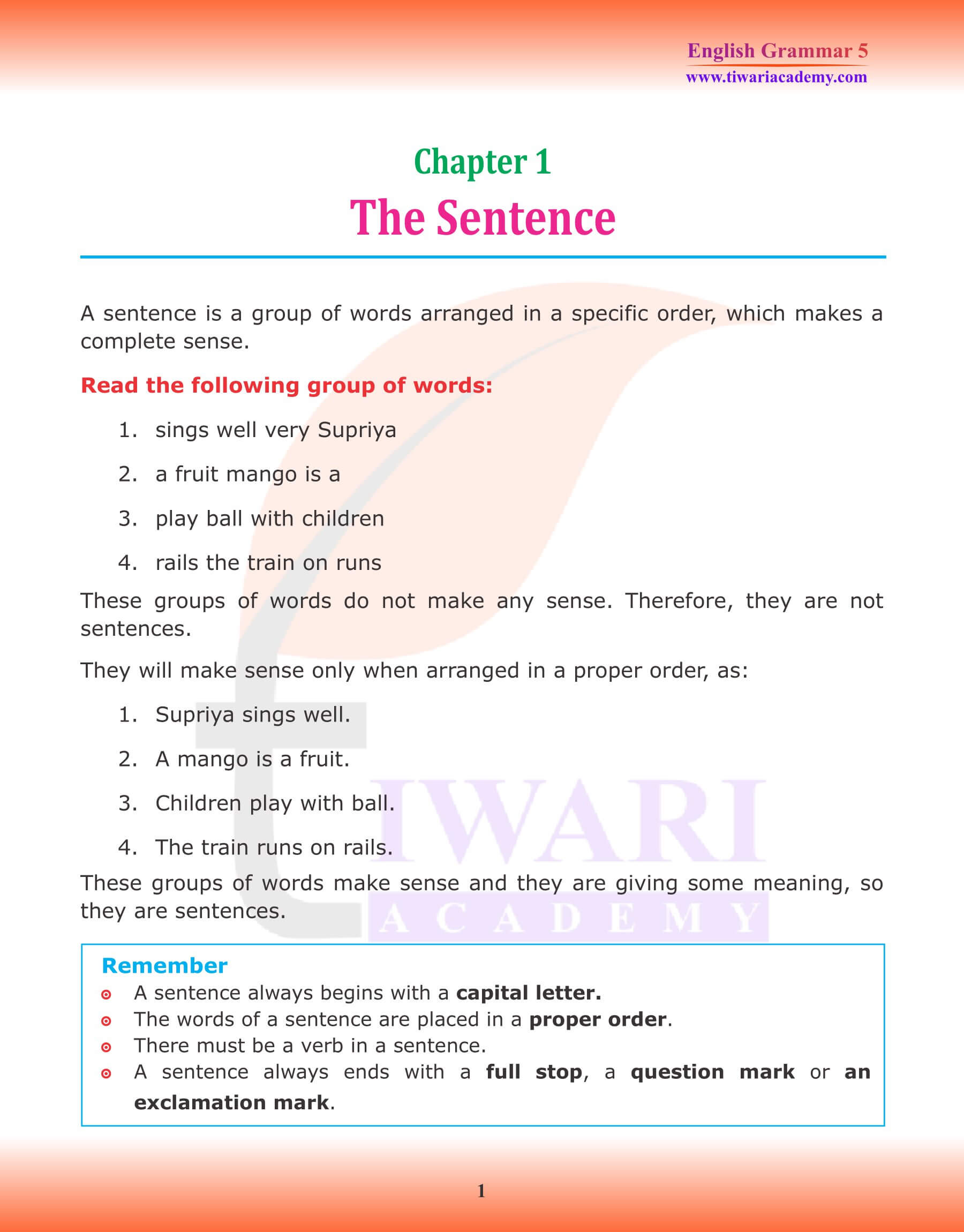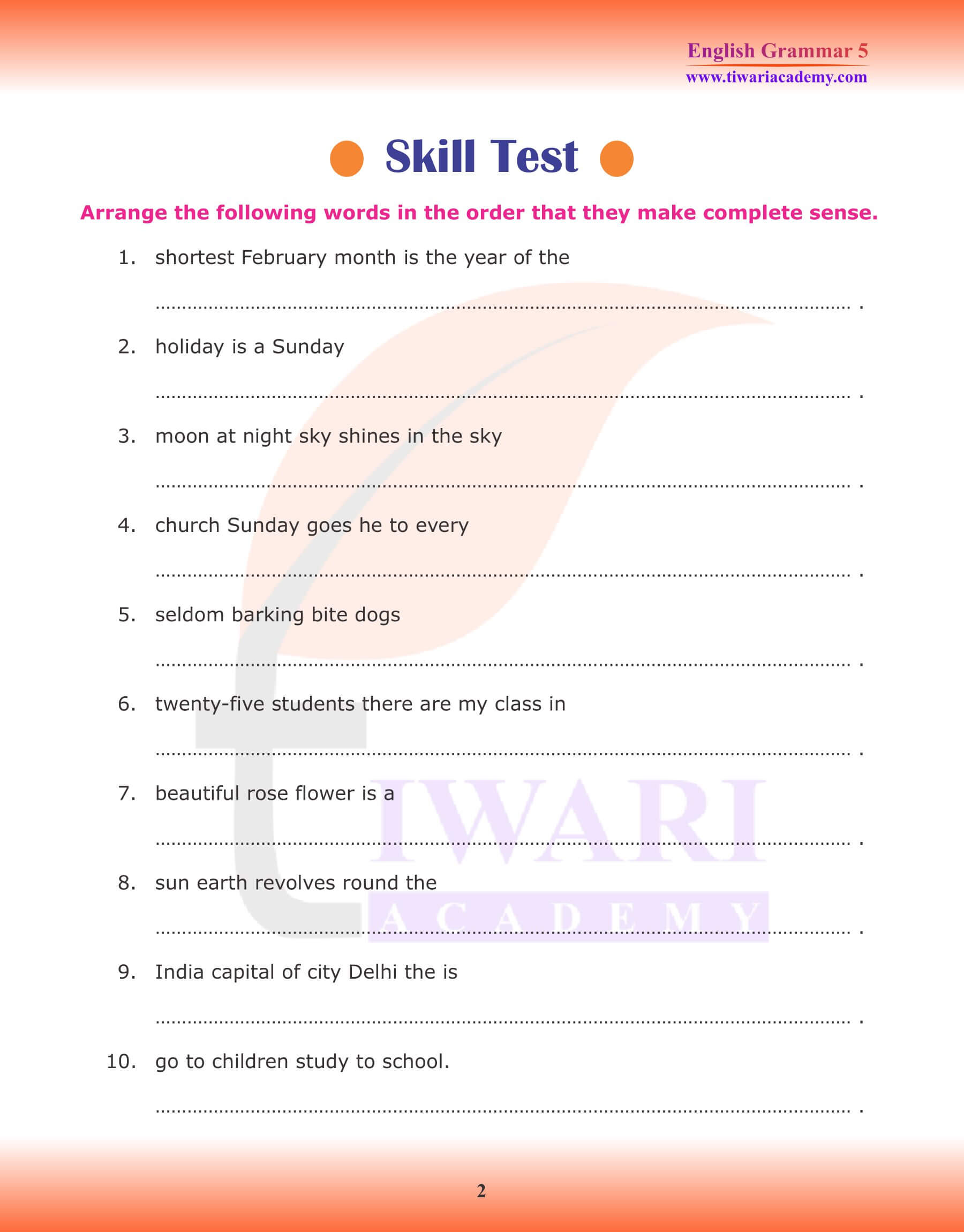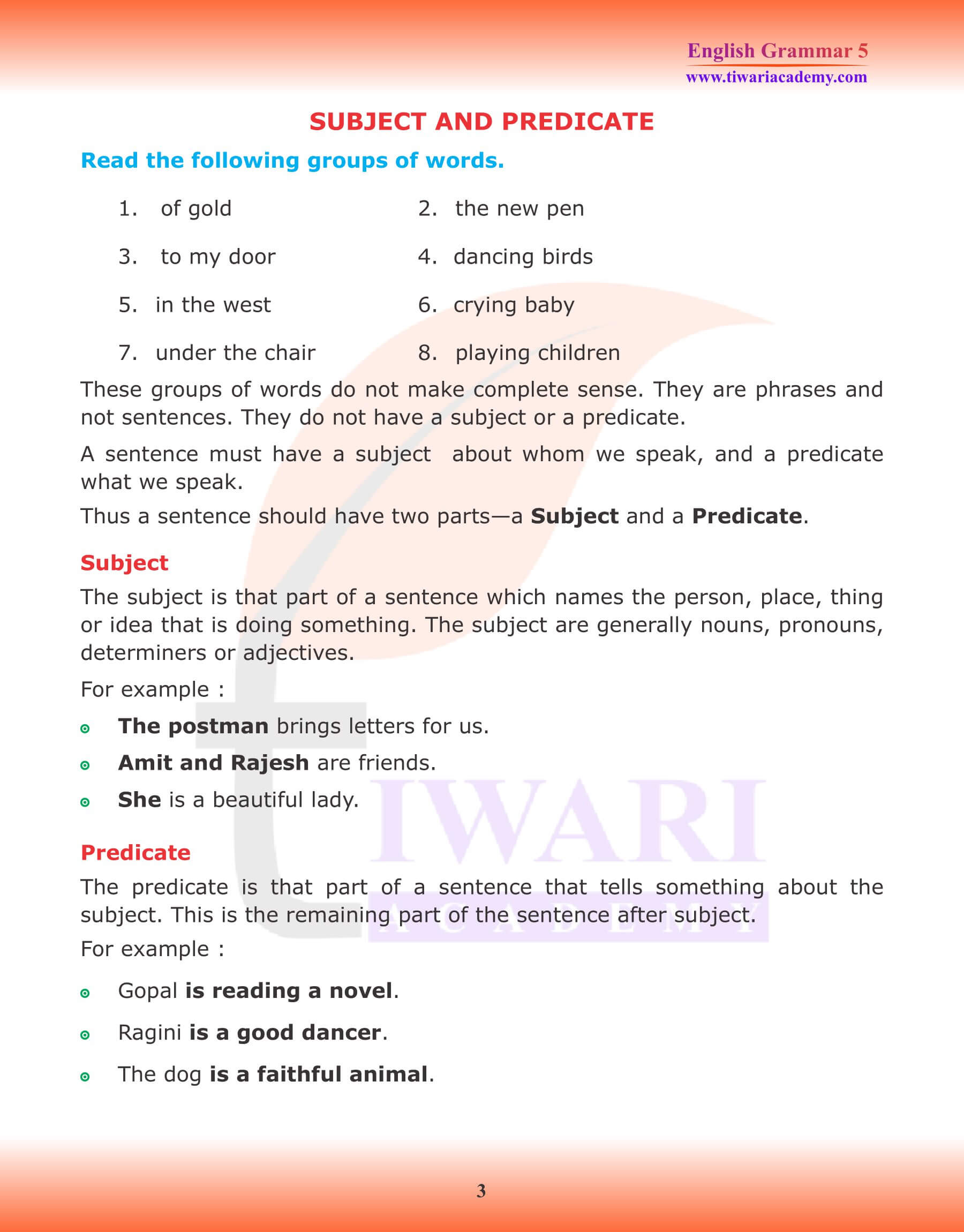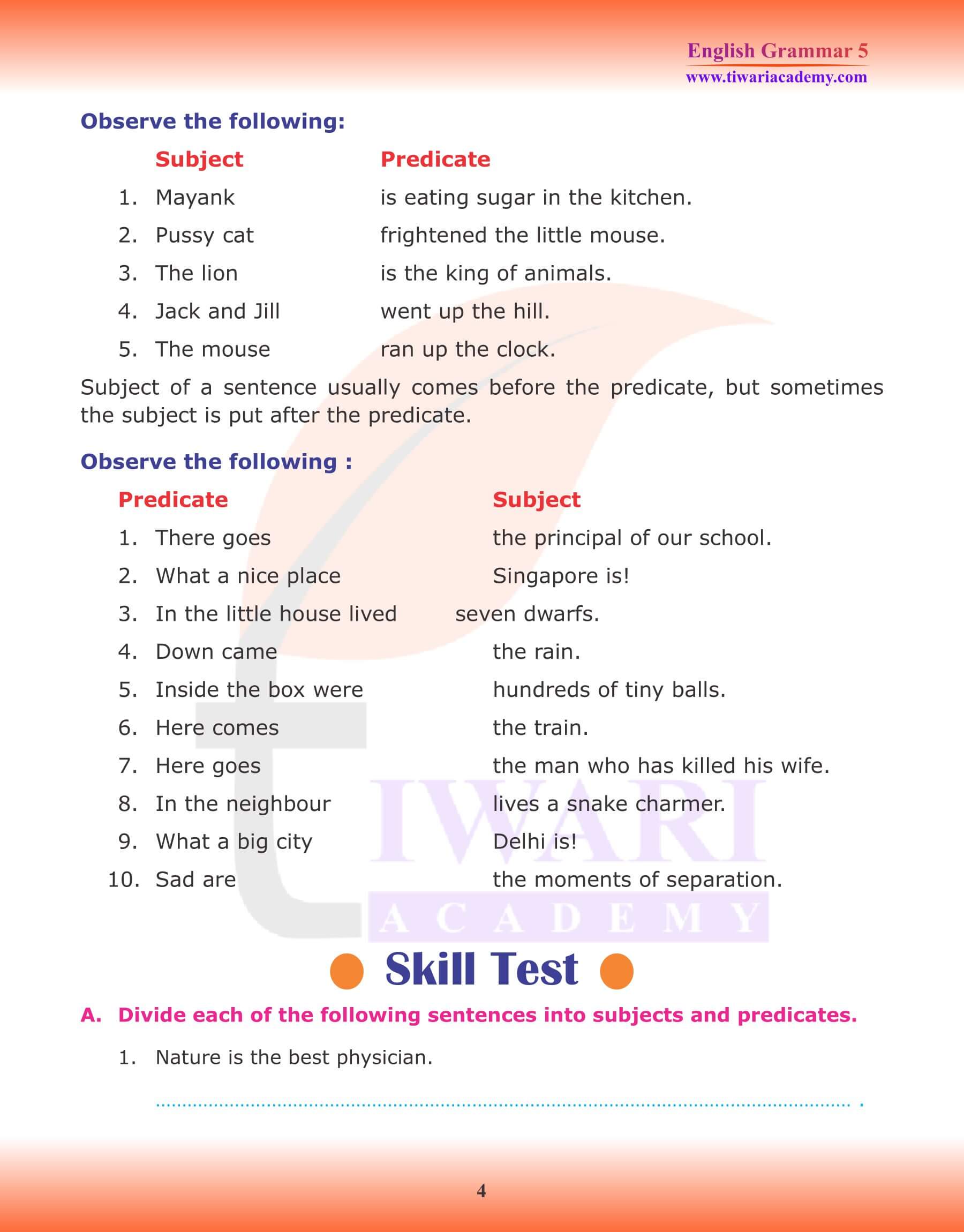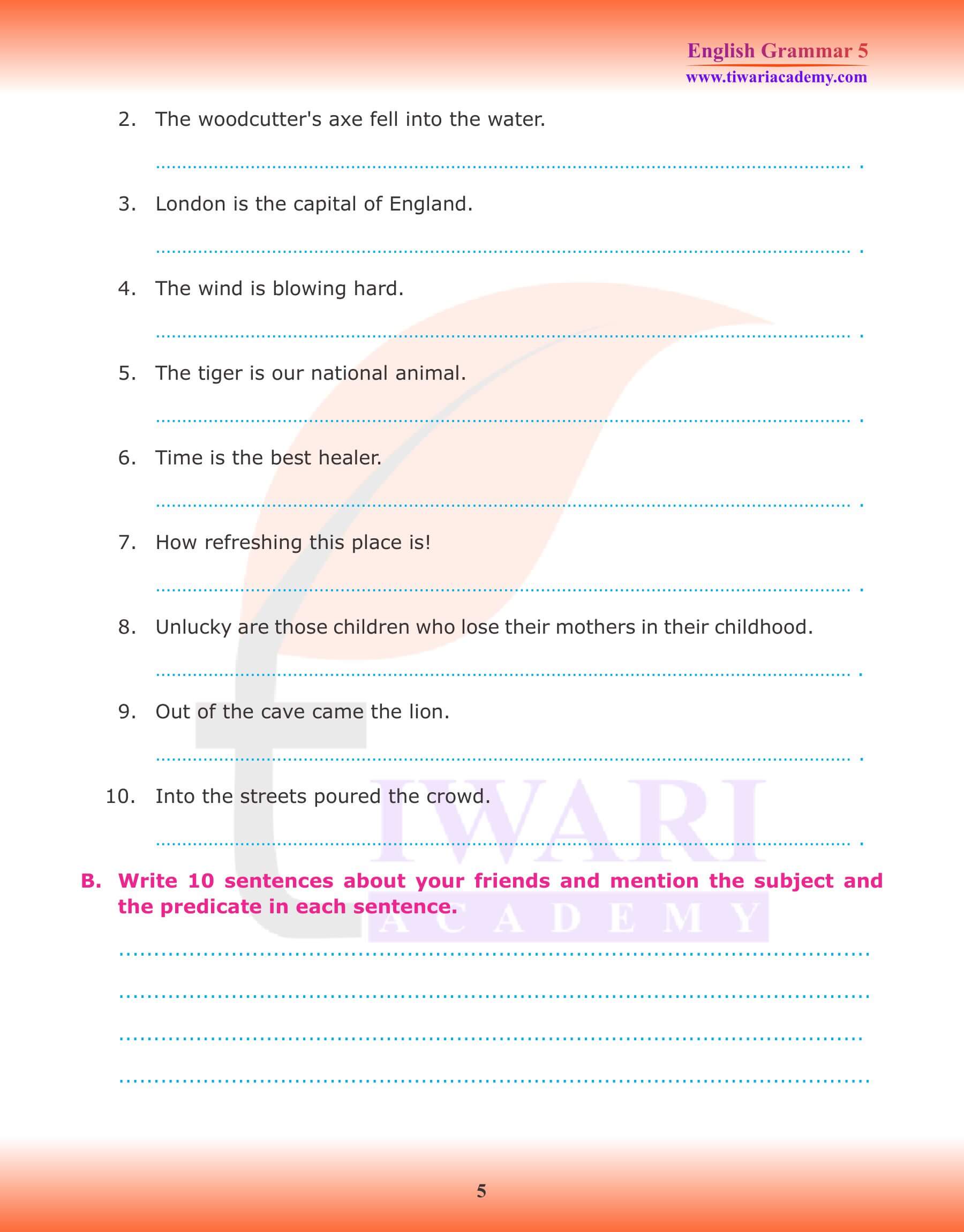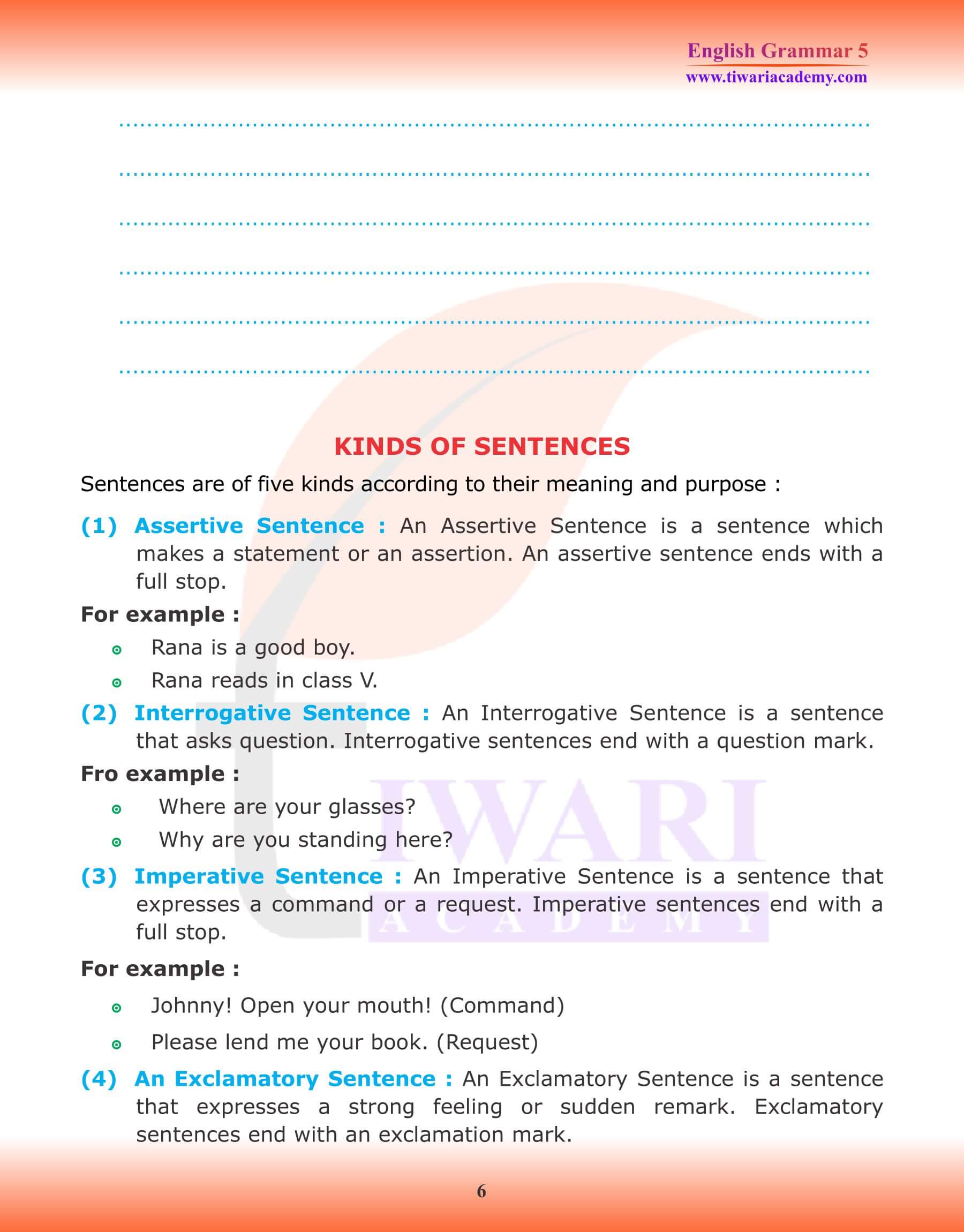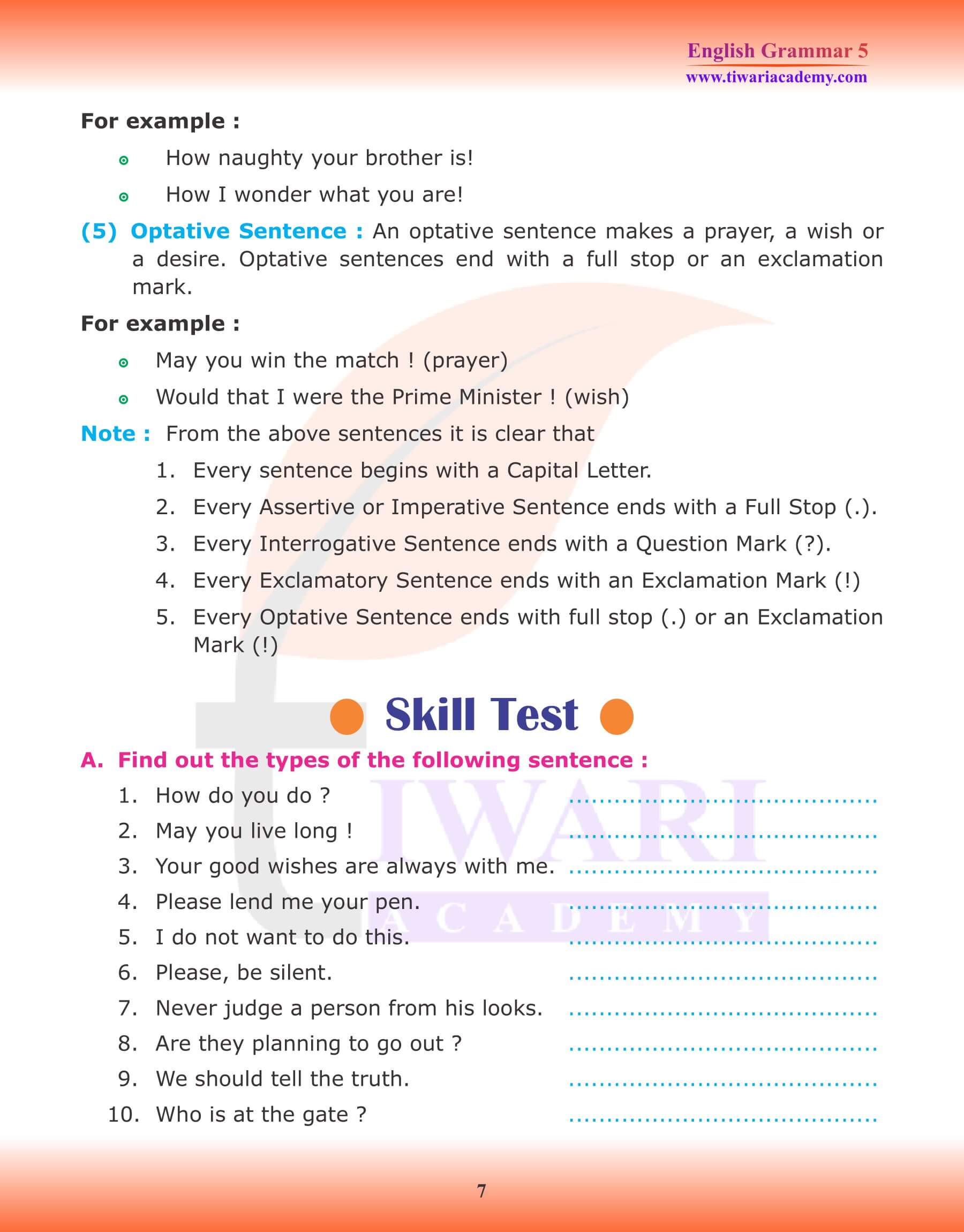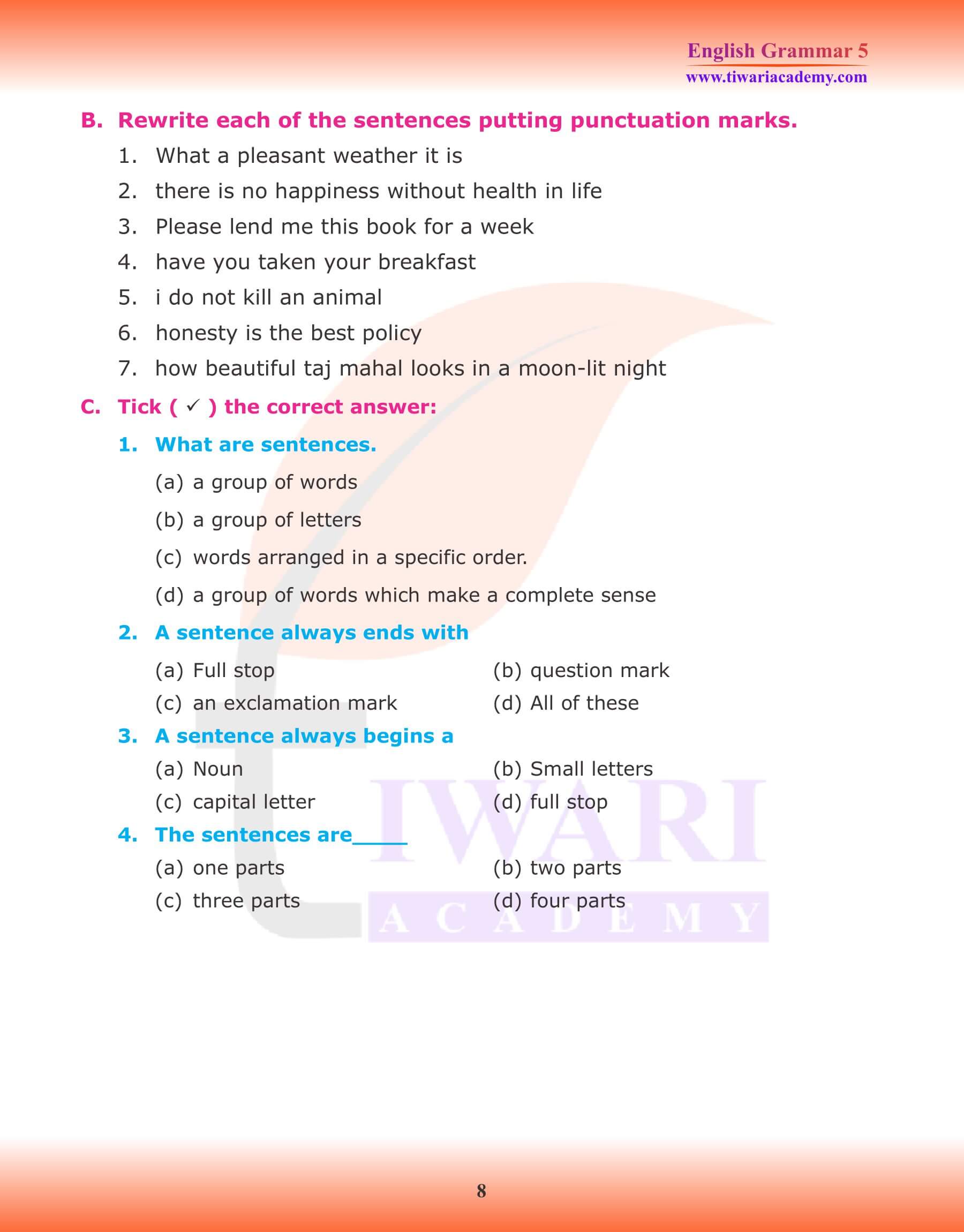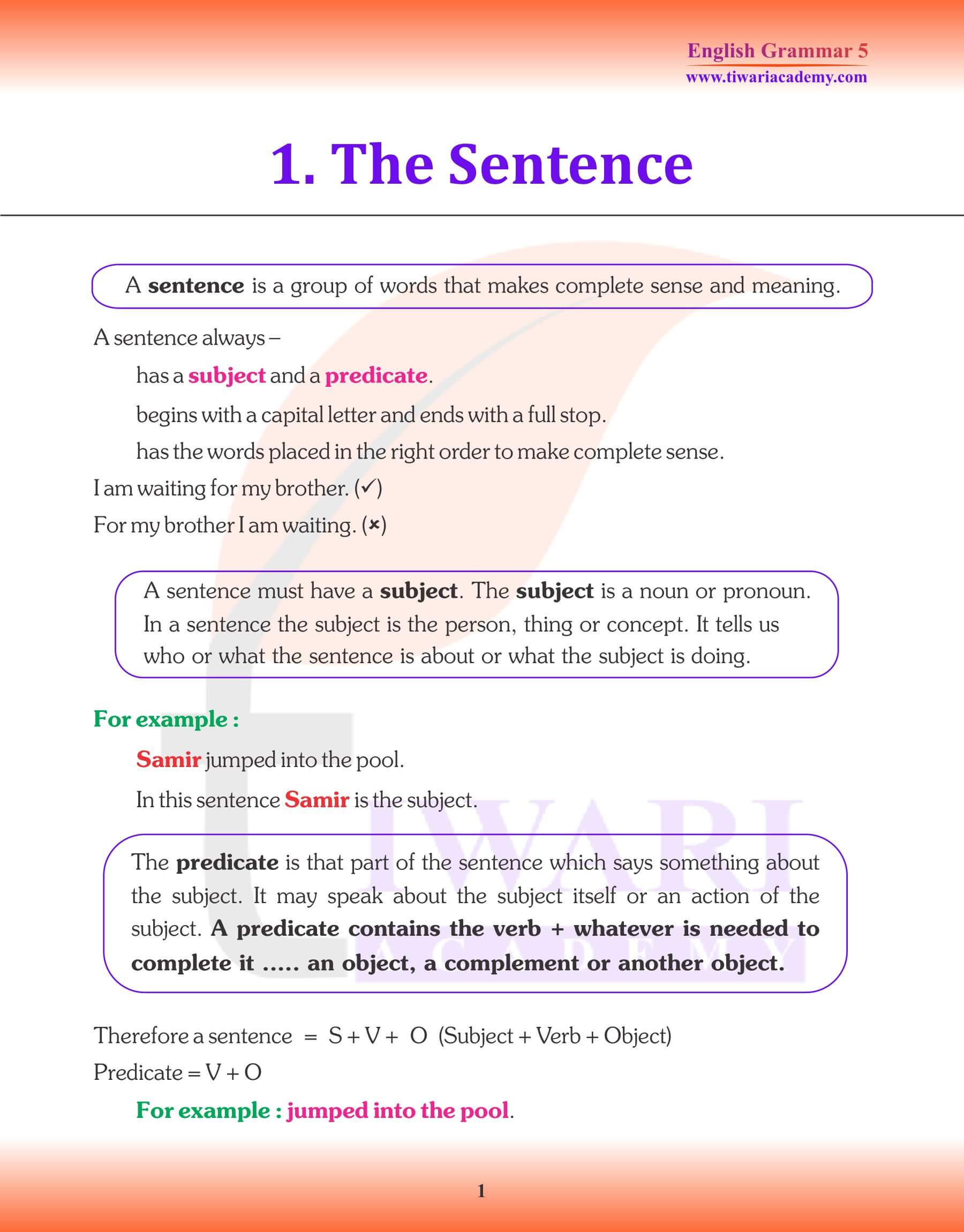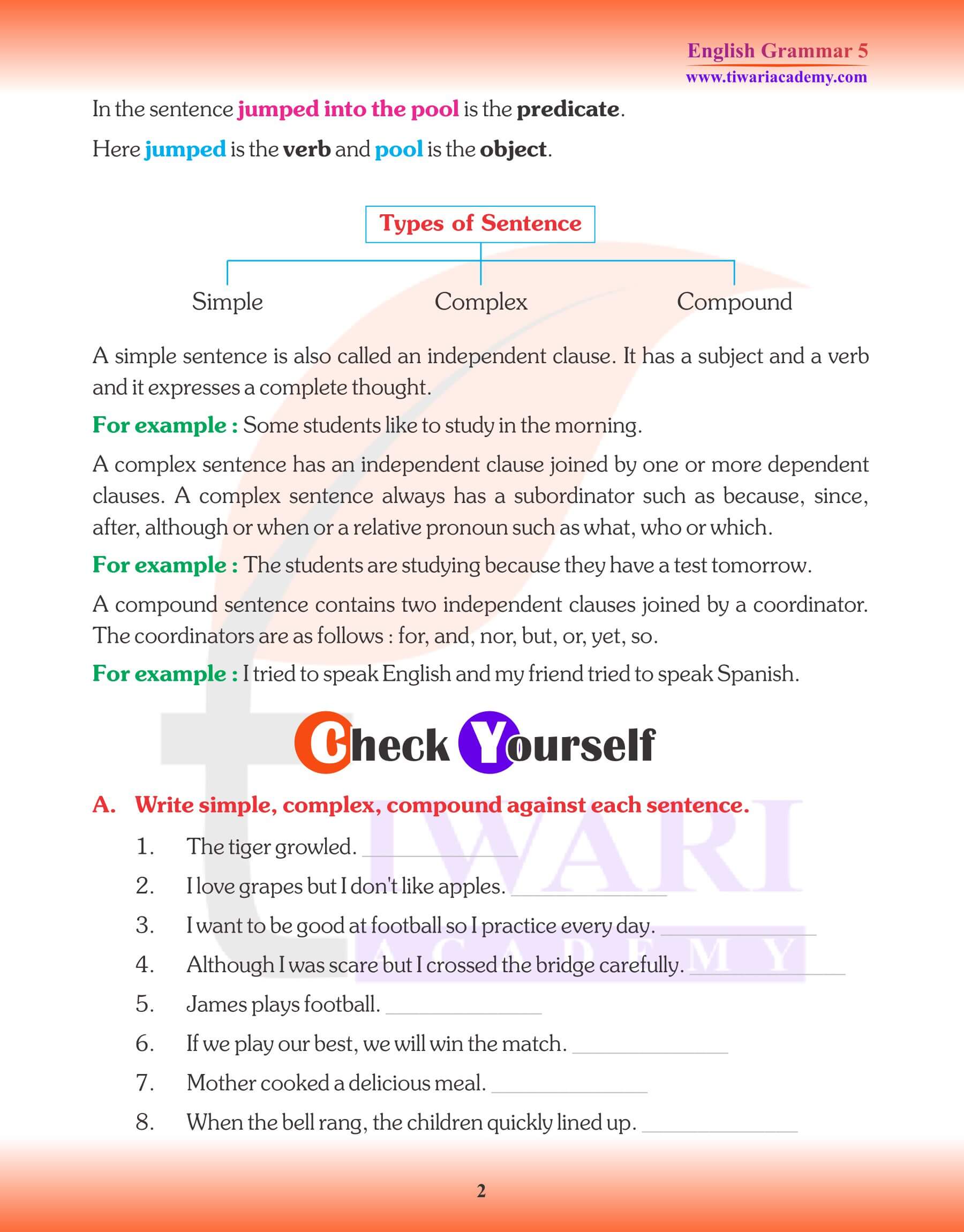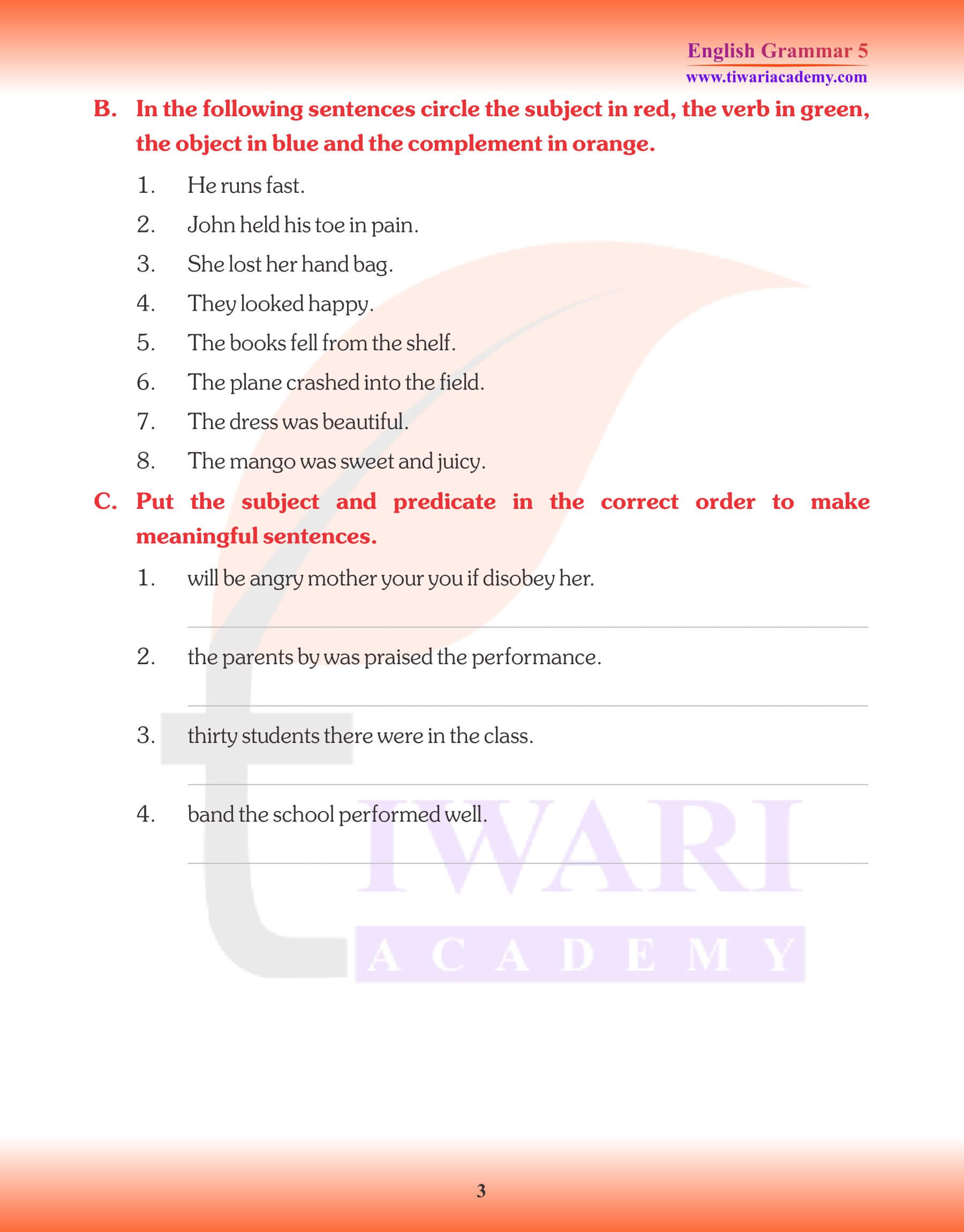NCERT Solutions for Class 5 English Grammar Chapter 1 The Sentence updated for new academic session 2024-25 free to use or download in PDF format. Here we will learn about the terms of sentences and the way how to prepare sentence. Do you know that A sentence is a group of words arranged in a specific order, which makes a complete sense.
NCERT Class 5 English Grammar Chapter 1 The Sentence
Class 5 English Grammar Chapter 1 The Sentence
| Class: 5 | English Grammar |
| Chapter: 1 | The Sentence |
Important terms for Sentence
- A sentence always begins with a capital letter.
- The words of a sentence are placed in a proper order.
- There must be a verb in a sentence.
- A sentence always ends with a full stop, a question mark, or an exclamation mark.
Read the following group of words:
1. Sings well very Supriya
2. A fruit mango is a
3. Play ball with children
4. Rails the train on runs
These groups of words do not make any sense. Therefore, they are not sentences.
They will make sense only when arranged in a proper order, as:
1. Supriya sings well.
2. A mango is a fruit.
3. Children play with ball.
4. The train runs on rails.
These groups of words make sense and they are giving some meaning, so they are sentences.
SUBJECT AND PREDICATE
Read the following groups of words:
1. of gold
2. the new pen
3. to my door
4. dancing birds
5. in the west
These groups of words do not make complete sense. They are phrases and not sentences. They do not have a subject or a predicate.
A sentence must have a subject about whom we speak, and a predicate what we speak.
Thus a sentence should have two parts—a Subject and a Predicate.
What is Subject?
The subject is that part of a sentence which names the person, place, thing or idea that is doing something. The subject are generally nouns, pronouns, determiners or adjectives.
For example:
- The postman brings letters for us.
- Amit and Rajesh are friends.
- She is a beautiful lady.
What is Predicate?
The predicate is that part of a sentence that tells something about the subject. This is the remaining part of the sentence after subject.
For example:
- 1. Gopal is reading a novel.
- 2. Ragini is a good dancer.
- 3. The dog is a faithful animal.
Example of Subject
| Subject | Predicate |
|---|---|
| 1. Mayank | is eating sugar in the kitchen. |
| 2. Pussy cat | frightened the little mouse. |
| 3. The lion | is the king of animals. |
| 4. Jack and Jill | went up the hill. |
| 5. The mouse | ran up the clock. |
Subject of a sentence usually comes before the predicate, but sometimes the subject is put after the predicate.
Examples of Predicate
| Predicate | Subject |
|---|---|
| 1. There goes | the principal of our school. |
| 2. What a nice place | Singapore is! |
| 3. In the little house lived | seven dwarfs. |
| 4. Down came | the rain. |
| 5. Inside the box were | hundreds of tiny balls. |
KINDS OF SENTENCES
Sentences are of five kinds according to their meaning and purpose:
(1) Assertive Sentence
An Assertive Sentence is a sentence which makes a statement or an assertion. An assertive sentence ends with a full stop.
For example:
1. Rana is a good boy.
2. Rana reads in class V.
(2) Interrogative Sentence
An Interrogative Sentence is a sentence that asks question. Interrogative sentences end with a question mark.
For example:
1. Where are your glasses?
2. Why are you standing here?
(3) Imperative Sentence
An Imperative Sentence is a sentence that expresses a command or a request. Imperative sentences end with a full stop.
For example:
1. Johnny! Open your mouth! (Command)
2. Please lend me your book. (Request)
(4) An Exclamatory Sentence
An Exclamatory Sentence is a sentence that expresses a strong feeling or sudden remark. Exclamatory sentences end with an exclamation mark.
For example:
1. How naughty your brother is!
2. How I wonder what you are!
(5) Optative Sentence
An optative sentence makes a prayer, a wish or a desire. Optative sentences end with a full stop or an exclamation mark.
For example:
1. May you win the match! (prayer)
2. Would that I was the Prime Minister! (wish)
Note: From the above sentences it is clear that:
- Every sentence begins with a Capital Letter.
- Every Assertive or Imperative Sentence ends with a Full Stop (.).
- Every Interrogative Sentence ends with a Question Mark (?).
- Every Exclamatory Sentence ends with an Exclamation Mark (!)
- Every Operative Sentence ends with full stop (.) or an Exclamation Mark (!)
What is the sentence in Class 5 English Grammar chapter 1?
Ans: A sentence is a group of words arranged in a specific order, which makes a complete sense.
What do you study about the predicate in Chapter 1 Class 5 English Grammar?
Ans: The predicate is that part of a sentence that tells something about the subject. This is the remaining part of the sentence after subject.
Ex: Ragini is a good dancer.
What is the role of an imperative sentence in 5th Grammar Chapter 1?
Ans: An Imperative Sentence is a sentence that expresses a command or a request. Imperative sentences end with a full stop.
Ex: Please lend me your book. (Request)
